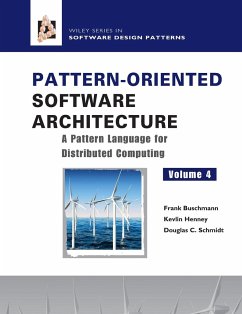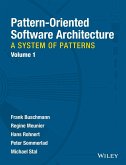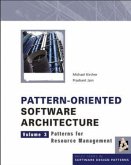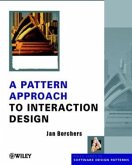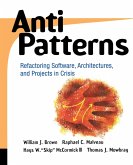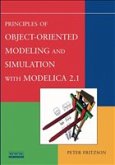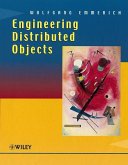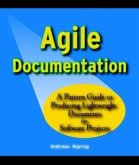Frank Buschmann, Kevlin Henney, Douglas C. Schmidt
Pattern-Oriented Software Architecture, a Pattern Language for Distributed Computing
Frank Buschmann, Kevlin Henney, Douglas C. Schmidt
Pattern-Oriented Software Architecture, a Pattern Language for Distributed Computing
- Gebundenes Buch
- Merkliste
- Auf die Merkliste
- Bewerten Bewerten
- Teilen
- Produkt teilen
- Produkterinnerung
- Produkterinnerung
The eagerly awaited Pattern-Oriented Software Architecture (POSA) Volume 4 is about a pattern language for distributed computing.
The authors will guide you through the best practices and introduce you to key areas of building distributed software systems. POSA 4 connects many stand-alone patterns, pattern collections and pattern languages from the existing body of literature found in the POSA series. Such patterns relate to and are useful for distributed computing to a single language.
The panel of experts provides you with a consistent and coherent holistic view on the craft of…mehr
Andere Kunden interessierten sich auch für
![Pattern-Oriented Software Architecture, a System of Patterns Pattern-Oriented Software Architecture, a System of Patterns]() Frank BuschmannPattern-Oriented Software Architecture, a System of Patterns44,99 €
Frank BuschmannPattern-Oriented Software Architecture, a System of Patterns44,99 €![Pattern-Oriented Software Architecture Pattern-Oriented Software Architecture]() Michael KircherPattern-Oriented Software Architecture64,99 €
Michael KircherPattern-Oriented Software Architecture64,99 €![A Pattern Approach to Interaction Design A Pattern Approach to Interaction Design]() Jan BorchersA Pattern Approach to Interaction Design82,99 €
Jan BorchersA Pattern Approach to Interaction Design82,99 €![Antipatterns Antipatterns]() William J. BrownAntipatterns55,99 €
William J. BrownAntipatterns55,99 €![Principles of Object-Oriented Modeling and Simulation with Modelica 2.1 Principles of Object-Oriented Modeling and Simulation with Modelica 2.1]() Peter A. FritzsonPrinciples of Object-Oriented Modeling and Simulation with Modelica 2.1163,99 €
Peter A. FritzsonPrinciples of Object-Oriented Modeling and Simulation with Modelica 2.1163,99 €![Engineering Distributed Objects Engineering Distributed Objects]() Wolfgang EmmerichEngineering Distributed Objects95,99 €
Wolfgang EmmerichEngineering Distributed Objects95,99 €![Agile Documentation Agile Documentation]() Andreas RüpingAgile Documentation44,99 €
Andreas RüpingAgile Documentation44,99 €-
-
-
The eagerly awaited Pattern-Oriented Software Architecture (POSA) Volume 4 is about a pattern language for distributed computing.
The authors will guide you through the best practices and introduce you to key areas of building distributed software systems. POSA 4 connects many stand-alone patterns, pattern collections and pattern languages from the existing body of literature found in the POSA series. Such patterns relate to and are useful for distributed computing to a single language.
The panel of experts provides you with a consistent and coherent holistic view on the craft of building distributed systems.
Includes a foreword by Martin Fowler
A must read for practitioners who want practical advice to develop a comprehensive language integrating patterns from key literature.
Hinweis: Dieser Artikel kann nur an eine deutsche Lieferadresse ausgeliefert werden.
The authors will guide you through the best practices and introduce you to key areas of building distributed software systems. POSA 4 connects many stand-alone patterns, pattern collections and pattern languages from the existing body of literature found in the POSA series. Such patterns relate to and are useful for distributed computing to a single language.
The panel of experts provides you with a consistent and coherent holistic view on the craft of building distributed systems.
Includes a foreword by Martin Fowler
A must read for practitioners who want practical advice to develop a comprehensive language integrating patterns from key literature.
Hinweis: Dieser Artikel kann nur an eine deutsche Lieferadresse ausgeliefert werden.
Produktdetails
- Produktdetails
- Wiley Series in Software Design Patterns
- Verlag: Wiley & Sons
- Artikelnr. des Verlages: 14505902000
- 1. Auflage
- Seitenzahl: 640
- Erscheinungstermin: 16. März 2007
- Englisch
- Abmessung: 241mm x 196mm x 38mm
- Gewicht: 1277g
- ISBN-13: 9780470059029
- ISBN-10: 0470059028
- Artikelnr.: 22520888
- Herstellerkennzeichnung
- Libri GmbH
- Europaallee 1
- 36244 Bad Hersfeld
- 06621 890
- Wiley Series in Software Design Patterns
- Verlag: Wiley & Sons
- Artikelnr. des Verlages: 14505902000
- 1. Auflage
- Seitenzahl: 640
- Erscheinungstermin: 16. März 2007
- Englisch
- Abmessung: 241mm x 196mm x 38mm
- Gewicht: 1277g
- ISBN-13: 9780470059029
- ISBN-10: 0470059028
- Artikelnr.: 22520888
- Herstellerkennzeichnung
- Libri GmbH
- Europaallee 1
- 36244 Bad Hersfeld
- 06621 890
Frank Buschmann, Siemens AG, Germany Kevlin Henney, Curbralan, Bristol, UK Douglas C. Schmidt, Vanderbilt University, Nashville, Tennessee, USA
Foreword xv
About This Book xvii
About The Authors xxiii
Guide To The Reader xxvii
Part I Some Concepts 1
1 On Patterns and Pattern Languages 3
1.1 Patterns Introduced 4
1.2 Inside Patterns 6
1.3 Between Patterns 10
1.4 Into Pattern Languages 13
1.5 Patterns Connected 15
2 On Distributed Systems 17
2.1 Benefits of Distribution 18
2.2 Challenges of Distribution 20
2.3 Technologies for Supporting Distribution 22
2.4 Limitations of Middleware 32
3 On the Pattern Language 33
3.1 Intent, Scope, and Audience 34
3.2 Origins and Genesis 35
3.3 Structure and Content 36
3.4 Presentation 44
3.5 Practical Use 49
Part II A Story 53
4 Warehouse Management Process Control 57
4.1 System Scope 58
4.2 Warehouse Management Process Control 60
5 Baseline Architecture 65
5.1 Architecture Context 66
5.2 Partitioning the Big Ball of Mud 67
5.3 Decomposing the Layers 68
5.4 Accessing Domain Object Functionality 71
5.5 Bridging the Network 72
5.6 Separating User Interfaces 76
5.7 Distributing Functionality 79
5.8 Supporting Concurrent Domain Object Access 82
5.9 Achieving Scalable Concurrency 85
5.10 Crossing the Object-Oriented/Relational Divide 87
5.11 Configuring Domain Objects at Runtime 89
5.12 Baseline Architecture Summary 90
6 Communication Middleware 95
6.1 A Middleware Architecture for Distributed Systems 96
6.2 Structuring the Internal Design of the Middleware 100
6.3 Encapsulating Low-level System Mechanisms 103
6.4 Demultiplexing ORB Core Events 105
6.5 Managing ORB Connections 108
6.6 Enhancing ORB Scalability 111
6.7 Implementing a Synchronized Request Queue 114
6.8 Interchangeable Internal ORB Mechanisms 116
6.9 Consolidating ORB Strategies 118
6.10 Dynamic Configuration of ORBs 121
6.11 Communication Middleware Summary 124
7 Warehouse Topology 129
7.1 Warehouse Topology Baseline 130
7.2 Representing Hierarchical Storage 131
7.3 Navigating the Storage Hierarchy 133
7.4 Modeling Storage Properties 135
7.5 Varying Storage Behavior 137
7.6 Realizing Global Functionality 140
7.7 Traversing the Warehouse Topology 142
7.8 Supporting Control Flow Extensions 144
7.9 Connecting to the Database 146
7.10 Maintaining In-Memory Storage Data 147
7.11 Configuring the Warehouse Topology 149
7.12 Detailing the Explicit Interface 151
7.13 Warehouse Topology Summary 153
8 The Story Behind The Pattern Story 157
Part III The Language 163
9 From Mud To Structure 167
Domain Model ** 182
Layers ** 185
Model-View-Controller ** 188
Presentation-Abstraction-Control 191
Microkernel ** 194
Reflection * 197
Pipes and Filters ** 200
Shared Repository ** 202
Blackboard 205
Domain Object ** 208
10 Distribution Infrastructure 211
Messaging ** 221
Message Channel ** 224
Message Endpoint ** 227
Message Translator ** 229
Message Router ** 231
Publisher-Subscriber ** 234
Broker ** 237
Client Proxy ** 240
Requestor ** 242
Invoker ** 244
Client Request Handler ** 246
Server Request Handler ** 249
11 Event Demultiplexing and Dispatching 253
Reactor ** 259
Proactor * 262
Acceptor-Connector ** 265
Asynchronous Completion Token ** 268
12 Interface Partitioning 271
Explicit Interface ** 281
Extension Interface ** 284
Introspective Interface ** 286
Dynamic Invocation Interface * 288
Proxy ** 290
Business Delegate ** 292
Facade ** 294
Combined Method ** 296
Iterator ** 298
Enumeration Method ** 300
Batch Method ** 302
13 Component Partitioning 305
Encapsulated Implementation ** 313
Whole-Part ** 317
Composite ** 319
Master-Slave * 321
Half-Object plus Protocol ** 324
Replicated Component Group * 326
14 Application Control 329
Page Controller ** 337
Front Controller ** 339
Application Controller ** 341
Command Processor ** 343
Template View ** 345
Transform View ** 347
Firewall Proxy ** 349
Authorization ** 351
15 Concurrency 353
Half-Sync/Half-Async ** 359
Leader/Followers ** 362
Active Object ** 365
Monitor Object ** 368
16 Synchronization 371
Guarded Suspension ** 380
Future ** 382
Thread-Safe Interface * 384
Double-Checked Locking 386
Strategized Locking ** 388
Scoped Locking ** 390
Thread-Specific Storage 392
Copied Value ** 394
Immutable Value ** 396
17 Object Interaction 399
Observer ** 405
Double Dispatch ** 408
Mediator * 410
Command ** 412
Memento ** 414
Context Object ** 416
Data Transfer Object ** 418
Message ** 420
18 Adaptation and Extension 423
Bridge ** 436
Object Adapter ** 438
Chain of Responsibility * 440
Interpreter 442
Interceptor ** 444
Visitor ** 447
Decorator 449
Execute-Around Object ** 451
Template Method * 453
Strategy ** 455
Null Object ** 457
Wrapper Facade ** 459
Declarative Component Configuration * 461
19 Modal Behavior 463
Objects for States * 467
Methods for States * 469
Collections for States ** 471
20 Resource Management 473
Container * 488
Component Configurator * 490
Object Manager ** 492
Lookup ** 495
Virtual Proxy ** 497
Lifecycle Callback ** 499
Task Coordinator * 501
Resource Pool ** 503
Resource Cache ** 505
Lazy Acquisition ** 507
Eager Acquisition ** 509
Partial Acquisition * 511
Activator ** 513
Evictor ** 515
Leasing ** 517
Automated Garbage Collection ** 519
Counting Handle ** 522
Abstract Factory ** 525
Builder * 527
Factory Method ** 529
Disposal Method ** 531
21 Database Access 533
Database Access Layer ** 538
Data Mapper ** 540
Row Data Gateway ** 542
Table Data Gateway ** 544
Active Record 546
22 A Departing Thought 549
Glossary 553
References 573
Index of Patterns 587
Index of Names 593
Subject Index 595
About This Book xvii
About The Authors xxiii
Guide To The Reader xxvii
Part I Some Concepts 1
1 On Patterns and Pattern Languages 3
1.1 Patterns Introduced 4
1.2 Inside Patterns 6
1.3 Between Patterns 10
1.4 Into Pattern Languages 13
1.5 Patterns Connected 15
2 On Distributed Systems 17
2.1 Benefits of Distribution 18
2.2 Challenges of Distribution 20
2.3 Technologies for Supporting Distribution 22
2.4 Limitations of Middleware 32
3 On the Pattern Language 33
3.1 Intent, Scope, and Audience 34
3.2 Origins and Genesis 35
3.3 Structure and Content 36
3.4 Presentation 44
3.5 Practical Use 49
Part II A Story 53
4 Warehouse Management Process Control 57
4.1 System Scope 58
4.2 Warehouse Management Process Control 60
5 Baseline Architecture 65
5.1 Architecture Context 66
5.2 Partitioning the Big Ball of Mud 67
5.3 Decomposing the Layers 68
5.4 Accessing Domain Object Functionality 71
5.5 Bridging the Network 72
5.6 Separating User Interfaces 76
5.7 Distributing Functionality 79
5.8 Supporting Concurrent Domain Object Access 82
5.9 Achieving Scalable Concurrency 85
5.10 Crossing the Object-Oriented/Relational Divide 87
5.11 Configuring Domain Objects at Runtime 89
5.12 Baseline Architecture Summary 90
6 Communication Middleware 95
6.1 A Middleware Architecture for Distributed Systems 96
6.2 Structuring the Internal Design of the Middleware 100
6.3 Encapsulating Low-level System Mechanisms 103
6.4 Demultiplexing ORB Core Events 105
6.5 Managing ORB Connections 108
6.6 Enhancing ORB Scalability 111
6.7 Implementing a Synchronized Request Queue 114
6.8 Interchangeable Internal ORB Mechanisms 116
6.9 Consolidating ORB Strategies 118
6.10 Dynamic Configuration of ORBs 121
6.11 Communication Middleware Summary 124
7 Warehouse Topology 129
7.1 Warehouse Topology Baseline 130
7.2 Representing Hierarchical Storage 131
7.3 Navigating the Storage Hierarchy 133
7.4 Modeling Storage Properties 135
7.5 Varying Storage Behavior 137
7.6 Realizing Global Functionality 140
7.7 Traversing the Warehouse Topology 142
7.8 Supporting Control Flow Extensions 144
7.9 Connecting to the Database 146
7.10 Maintaining In-Memory Storage Data 147
7.11 Configuring the Warehouse Topology 149
7.12 Detailing the Explicit Interface 151
7.13 Warehouse Topology Summary 153
8 The Story Behind The Pattern Story 157
Part III The Language 163
9 From Mud To Structure 167
Domain Model ** 182
Layers ** 185
Model-View-Controller ** 188
Presentation-Abstraction-Control 191
Microkernel ** 194
Reflection * 197
Pipes and Filters ** 200
Shared Repository ** 202
Blackboard 205
Domain Object ** 208
10 Distribution Infrastructure 211
Messaging ** 221
Message Channel ** 224
Message Endpoint ** 227
Message Translator ** 229
Message Router ** 231
Publisher-Subscriber ** 234
Broker ** 237
Client Proxy ** 240
Requestor ** 242
Invoker ** 244
Client Request Handler ** 246
Server Request Handler ** 249
11 Event Demultiplexing and Dispatching 253
Reactor ** 259
Proactor * 262
Acceptor-Connector ** 265
Asynchronous Completion Token ** 268
12 Interface Partitioning 271
Explicit Interface ** 281
Extension Interface ** 284
Introspective Interface ** 286
Dynamic Invocation Interface * 288
Proxy ** 290
Business Delegate ** 292
Facade ** 294
Combined Method ** 296
Iterator ** 298
Enumeration Method ** 300
Batch Method ** 302
13 Component Partitioning 305
Encapsulated Implementation ** 313
Whole-Part ** 317
Composite ** 319
Master-Slave * 321
Half-Object plus Protocol ** 324
Replicated Component Group * 326
14 Application Control 329
Page Controller ** 337
Front Controller ** 339
Application Controller ** 341
Command Processor ** 343
Template View ** 345
Transform View ** 347
Firewall Proxy ** 349
Authorization ** 351
15 Concurrency 353
Half-Sync/Half-Async ** 359
Leader/Followers ** 362
Active Object ** 365
Monitor Object ** 368
16 Synchronization 371
Guarded Suspension ** 380
Future ** 382
Thread-Safe Interface * 384
Double-Checked Locking 386
Strategized Locking ** 388
Scoped Locking ** 390
Thread-Specific Storage 392
Copied Value ** 394
Immutable Value ** 396
17 Object Interaction 399
Observer ** 405
Double Dispatch ** 408
Mediator * 410
Command ** 412
Memento ** 414
Context Object ** 416
Data Transfer Object ** 418
Message ** 420
18 Adaptation and Extension 423
Bridge ** 436
Object Adapter ** 438
Chain of Responsibility * 440
Interpreter 442
Interceptor ** 444
Visitor ** 447
Decorator 449
Execute-Around Object ** 451
Template Method * 453
Strategy ** 455
Null Object ** 457
Wrapper Facade ** 459
Declarative Component Configuration * 461
19 Modal Behavior 463
Objects for States * 467
Methods for States * 469
Collections for States ** 471
20 Resource Management 473
Container * 488
Component Configurator * 490
Object Manager ** 492
Lookup ** 495
Virtual Proxy ** 497
Lifecycle Callback ** 499
Task Coordinator * 501
Resource Pool ** 503
Resource Cache ** 505
Lazy Acquisition ** 507
Eager Acquisition ** 509
Partial Acquisition * 511
Activator ** 513
Evictor ** 515
Leasing ** 517
Automated Garbage Collection ** 519
Counting Handle ** 522
Abstract Factory ** 525
Builder * 527
Factory Method ** 529
Disposal Method ** 531
21 Database Access 533
Database Access Layer ** 538
Data Mapper ** 540
Row Data Gateway ** 542
Table Data Gateway ** 544
Active Record 546
22 A Departing Thought 549
Glossary 553
References 573
Index of Patterns 587
Index of Names 593
Subject Index 595
Foreword xv
About This Book xvii
About The Authors xxiii
Guide To The Reader xxvii
Part I Some Concepts 1
1 On Patterns and Pattern Languages 3
1.1 Patterns Introduced 4
1.2 Inside Patterns 6
1.3 Between Patterns 10
1.4 Into Pattern Languages 13
1.5 Patterns Connected 15
2 On Distributed Systems 17
2.1 Benefits of Distribution 18
2.2 Challenges of Distribution 20
2.3 Technologies for Supporting Distribution 22
2.4 Limitations of Middleware 32
3 On the Pattern Language 33
3.1 Intent, Scope, and Audience 34
3.2 Origins and Genesis 35
3.3 Structure and Content 36
3.4 Presentation 44
3.5 Practical Use 49
Part II A Story 53
4 Warehouse Management Process Control 57
4.1 System Scope 58
4.2 Warehouse Management Process Control 60
5 Baseline Architecture 65
5.1 Architecture Context 66
5.2 Partitioning the Big Ball of Mud 67
5.3 Decomposing the Layers 68
5.4 Accessing Domain Object Functionality 71
5.5 Bridging the Network 72
5.6 Separating User Interfaces 76
5.7 Distributing Functionality 79
5.8 Supporting Concurrent Domain Object Access 82
5.9 Achieving Scalable Concurrency 85
5.10 Crossing the Object-Oriented/Relational Divide 87
5.11 Configuring Domain Objects at Runtime 89
5.12 Baseline Architecture Summary 90
6 Communication Middleware 95
6.1 A Middleware Architecture for Distributed Systems 96
6.2 Structuring the Internal Design of the Middleware 100
6.3 Encapsulating Low-level System Mechanisms 103
6.4 Demultiplexing ORB Core Events 105
6.5 Managing ORB Connections 108
6.6 Enhancing ORB Scalability 111
6.7 Implementing a Synchronized Request Queue 114
6.8 Interchangeable Internal ORB Mechanisms 116
6.9 Consolidating ORB Strategies 118
6.10 Dynamic Configuration of ORBs 121
6.11 Communication Middleware Summary 124
7 Warehouse Topology 129
7.1 Warehouse Topology Baseline 130
7.2 Representing Hierarchical Storage 131
7.3 Navigating the Storage Hierarchy 133
7.4 Modeling Storage Properties 135
7.5 Varying Storage Behavior 137
7.6 Realizing Global Functionality 140
7.7 Traversing the Warehouse Topology 142
7.8 Supporting Control Flow Extensions 144
7.9 Connecting to the Database 146
7.10 Maintaining In-Memory Storage Data 147
7.11 Configuring the Warehouse Topology 149
7.12 Detailing the Explicit Interface 151
7.13 Warehouse Topology Summary 153
8 The Story Behind The Pattern Story 157
Part III The Language 163
9 From Mud To Structure 167
Domain Model ** 182
Layers ** 185
Model-View-Controller ** 188
Presentation-Abstraction-Control 191
Microkernel ** 194
Reflection * 197
Pipes and Filters ** 200
Shared Repository ** 202
Blackboard 205
Domain Object ** 208
10 Distribution Infrastructure 211
Messaging ** 221
Message Channel ** 224
Message Endpoint ** 227
Message Translator ** 229
Message Router ** 231
Publisher-Subscriber ** 234
Broker ** 237
Client Proxy ** 240
Requestor ** 242
Invoker ** 244
Client Request Handler ** 246
Server Request Handler ** 249
11 Event Demultiplexing and Dispatching 253
Reactor ** 259
Proactor * 262
Acceptor-Connector ** 265
Asynchronous Completion Token ** 268
12 Interface Partitioning 271
Explicit Interface ** 281
Extension Interface ** 284
Introspective Interface ** 286
Dynamic Invocation Interface * 288
Proxy ** 290
Business Delegate ** 292
Facade ** 294
Combined Method ** 296
Iterator ** 298
Enumeration Method ** 300
Batch Method ** 302
13 Component Partitioning 305
Encapsulated Implementation ** 313
Whole-Part ** 317
Composite ** 319
Master-Slave * 321
Half-Object plus Protocol ** 324
Replicated Component Group * 326
14 Application Control 329
Page Controller ** 337
Front Controller ** 339
Application Controller ** 341
Command Processor ** 343
Template View ** 345
Transform View ** 347
Firewall Proxy ** 349
Authorization ** 351
15 Concurrency 353
Half-Sync/Half-Async ** 359
Leader/Followers ** 362
Active Object ** 365
Monitor Object ** 368
16 Synchronization 371
Guarded Suspension ** 380
Future ** 382
Thread-Safe Interface * 384
Double-Checked Locking 386
Strategized Locking ** 388
Scoped Locking ** 390
Thread-Specific Storage 392
Copied Value ** 394
Immutable Value ** 396
17 Object Interaction 399
Observer ** 405
Double Dispatch ** 408
Mediator * 410
Command ** 412
Memento ** 414
Context Object ** 416
Data Transfer Object ** 418
Message ** 420
18 Adaptation and Extension 423
Bridge ** 436
Object Adapter ** 438
Chain of Responsibility * 440
Interpreter 442
Interceptor ** 444
Visitor ** 447
Decorator 449
Execute-Around Object ** 451
Template Method * 453
Strategy ** 455
Null Object ** 457
Wrapper Facade ** 459
Declarative Component Configuration * 461
19 Modal Behavior 463
Objects for States * 467
Methods for States * 469
Collections for States ** 471
20 Resource Management 473
Container * 488
Component Configurator * 490
Object Manager ** 492
Lookup ** 495
Virtual Proxy ** 497
Lifecycle Callback ** 499
Task Coordinator * 501
Resource Pool ** 503
Resource Cache ** 505
Lazy Acquisition ** 507
Eager Acquisition ** 509
Partial Acquisition * 511
Activator ** 513
Evictor ** 515
Leasing ** 517
Automated Garbage Collection ** 519
Counting Handle ** 522
Abstract Factory ** 525
Builder * 527
Factory Method ** 529
Disposal Method ** 531
21 Database Access 533
Database Access Layer ** 538
Data Mapper ** 540
Row Data Gateway ** 542
Table Data Gateway ** 544
Active Record 546
22 A Departing Thought 549
Glossary 553
References 573
Index of Patterns 587
Index of Names 593
Subject Index 595
About This Book xvii
About The Authors xxiii
Guide To The Reader xxvii
Part I Some Concepts 1
1 On Patterns and Pattern Languages 3
1.1 Patterns Introduced 4
1.2 Inside Patterns 6
1.3 Between Patterns 10
1.4 Into Pattern Languages 13
1.5 Patterns Connected 15
2 On Distributed Systems 17
2.1 Benefits of Distribution 18
2.2 Challenges of Distribution 20
2.3 Technologies for Supporting Distribution 22
2.4 Limitations of Middleware 32
3 On the Pattern Language 33
3.1 Intent, Scope, and Audience 34
3.2 Origins and Genesis 35
3.3 Structure and Content 36
3.4 Presentation 44
3.5 Practical Use 49
Part II A Story 53
4 Warehouse Management Process Control 57
4.1 System Scope 58
4.2 Warehouse Management Process Control 60
5 Baseline Architecture 65
5.1 Architecture Context 66
5.2 Partitioning the Big Ball of Mud 67
5.3 Decomposing the Layers 68
5.4 Accessing Domain Object Functionality 71
5.5 Bridging the Network 72
5.6 Separating User Interfaces 76
5.7 Distributing Functionality 79
5.8 Supporting Concurrent Domain Object Access 82
5.9 Achieving Scalable Concurrency 85
5.10 Crossing the Object-Oriented/Relational Divide 87
5.11 Configuring Domain Objects at Runtime 89
5.12 Baseline Architecture Summary 90
6 Communication Middleware 95
6.1 A Middleware Architecture for Distributed Systems 96
6.2 Structuring the Internal Design of the Middleware 100
6.3 Encapsulating Low-level System Mechanisms 103
6.4 Demultiplexing ORB Core Events 105
6.5 Managing ORB Connections 108
6.6 Enhancing ORB Scalability 111
6.7 Implementing a Synchronized Request Queue 114
6.8 Interchangeable Internal ORB Mechanisms 116
6.9 Consolidating ORB Strategies 118
6.10 Dynamic Configuration of ORBs 121
6.11 Communication Middleware Summary 124
7 Warehouse Topology 129
7.1 Warehouse Topology Baseline 130
7.2 Representing Hierarchical Storage 131
7.3 Navigating the Storage Hierarchy 133
7.4 Modeling Storage Properties 135
7.5 Varying Storage Behavior 137
7.6 Realizing Global Functionality 140
7.7 Traversing the Warehouse Topology 142
7.8 Supporting Control Flow Extensions 144
7.9 Connecting to the Database 146
7.10 Maintaining In-Memory Storage Data 147
7.11 Configuring the Warehouse Topology 149
7.12 Detailing the Explicit Interface 151
7.13 Warehouse Topology Summary 153
8 The Story Behind The Pattern Story 157
Part III The Language 163
9 From Mud To Structure 167
Domain Model ** 182
Layers ** 185
Model-View-Controller ** 188
Presentation-Abstraction-Control 191
Microkernel ** 194
Reflection * 197
Pipes and Filters ** 200
Shared Repository ** 202
Blackboard 205
Domain Object ** 208
10 Distribution Infrastructure 211
Messaging ** 221
Message Channel ** 224
Message Endpoint ** 227
Message Translator ** 229
Message Router ** 231
Publisher-Subscriber ** 234
Broker ** 237
Client Proxy ** 240
Requestor ** 242
Invoker ** 244
Client Request Handler ** 246
Server Request Handler ** 249
11 Event Demultiplexing and Dispatching 253
Reactor ** 259
Proactor * 262
Acceptor-Connector ** 265
Asynchronous Completion Token ** 268
12 Interface Partitioning 271
Explicit Interface ** 281
Extension Interface ** 284
Introspective Interface ** 286
Dynamic Invocation Interface * 288
Proxy ** 290
Business Delegate ** 292
Facade ** 294
Combined Method ** 296
Iterator ** 298
Enumeration Method ** 300
Batch Method ** 302
13 Component Partitioning 305
Encapsulated Implementation ** 313
Whole-Part ** 317
Composite ** 319
Master-Slave * 321
Half-Object plus Protocol ** 324
Replicated Component Group * 326
14 Application Control 329
Page Controller ** 337
Front Controller ** 339
Application Controller ** 341
Command Processor ** 343
Template View ** 345
Transform View ** 347
Firewall Proxy ** 349
Authorization ** 351
15 Concurrency 353
Half-Sync/Half-Async ** 359
Leader/Followers ** 362
Active Object ** 365
Monitor Object ** 368
16 Synchronization 371
Guarded Suspension ** 380
Future ** 382
Thread-Safe Interface * 384
Double-Checked Locking 386
Strategized Locking ** 388
Scoped Locking ** 390
Thread-Specific Storage 392
Copied Value ** 394
Immutable Value ** 396
17 Object Interaction 399
Observer ** 405
Double Dispatch ** 408
Mediator * 410
Command ** 412
Memento ** 414
Context Object ** 416
Data Transfer Object ** 418
Message ** 420
18 Adaptation and Extension 423
Bridge ** 436
Object Adapter ** 438
Chain of Responsibility * 440
Interpreter 442
Interceptor ** 444
Visitor ** 447
Decorator 449
Execute-Around Object ** 451
Template Method * 453
Strategy ** 455
Null Object ** 457
Wrapper Facade ** 459
Declarative Component Configuration * 461
19 Modal Behavior 463
Objects for States * 467
Methods for States * 469
Collections for States ** 471
20 Resource Management 473
Container * 488
Component Configurator * 490
Object Manager ** 492
Lookup ** 495
Virtual Proxy ** 497
Lifecycle Callback ** 499
Task Coordinator * 501
Resource Pool ** 503
Resource Cache ** 505
Lazy Acquisition ** 507
Eager Acquisition ** 509
Partial Acquisition * 511
Activator ** 513
Evictor ** 515
Leasing ** 517
Automated Garbage Collection ** 519
Counting Handle ** 522
Abstract Factory ** 525
Builder * 527
Factory Method ** 529
Disposal Method ** 531
21 Database Access 533
Database Access Layer ** 538
Data Mapper ** 540
Row Data Gateway ** 542
Table Data Gateway ** 544
Active Record 546
22 A Departing Thought 549
Glossary 553
References 573
Index of Patterns 587
Index of Names 593
Subject Index 595

